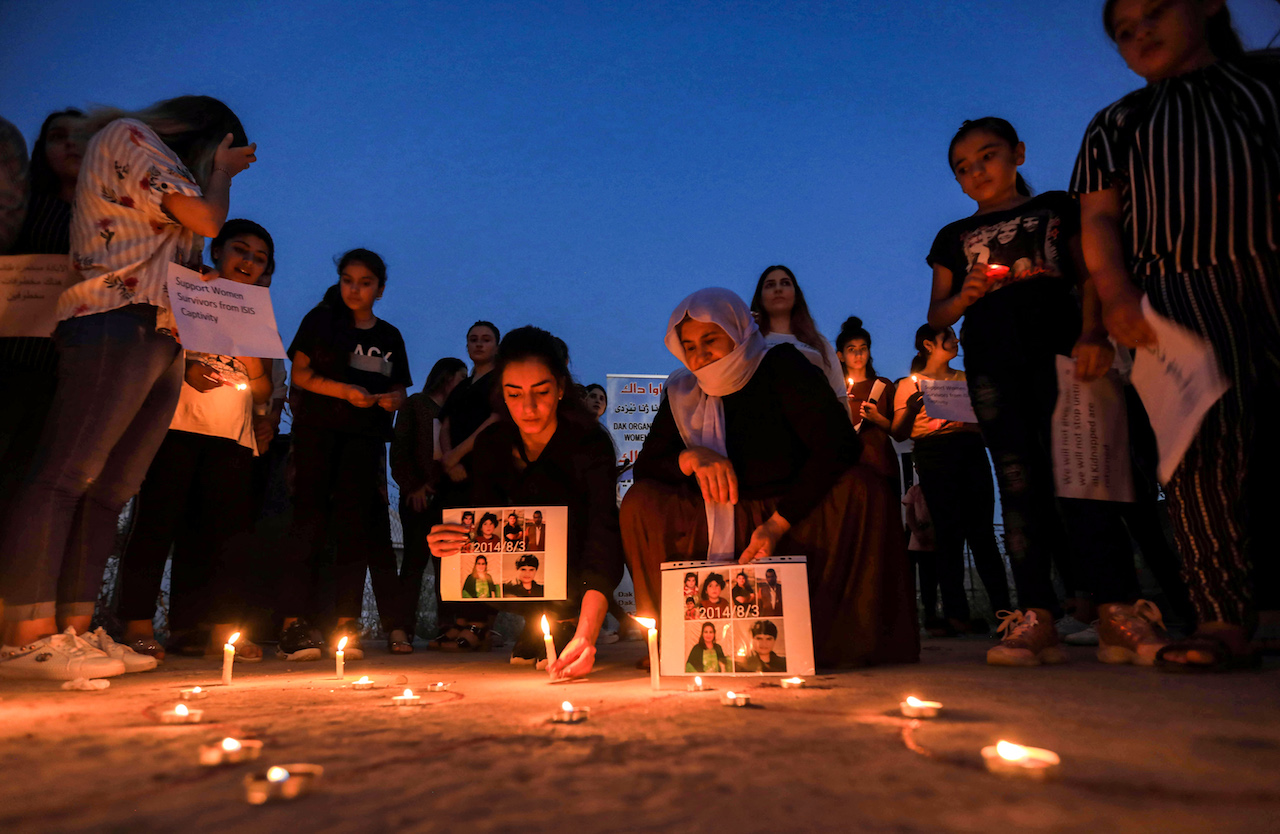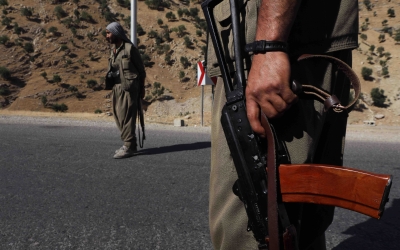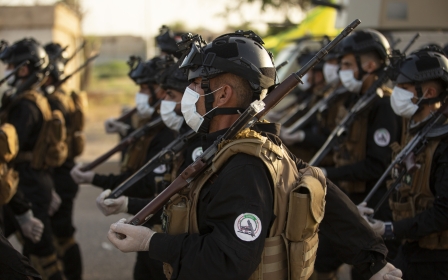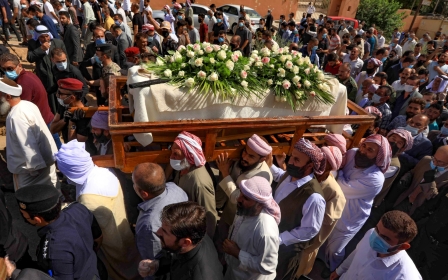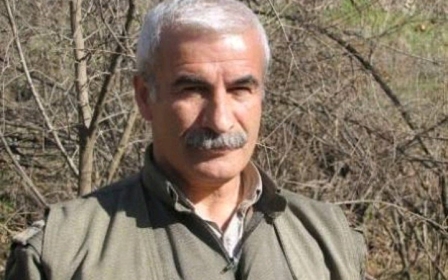Yazidis left out in cold following Iraqi deal to remove armed groups from Sinjar
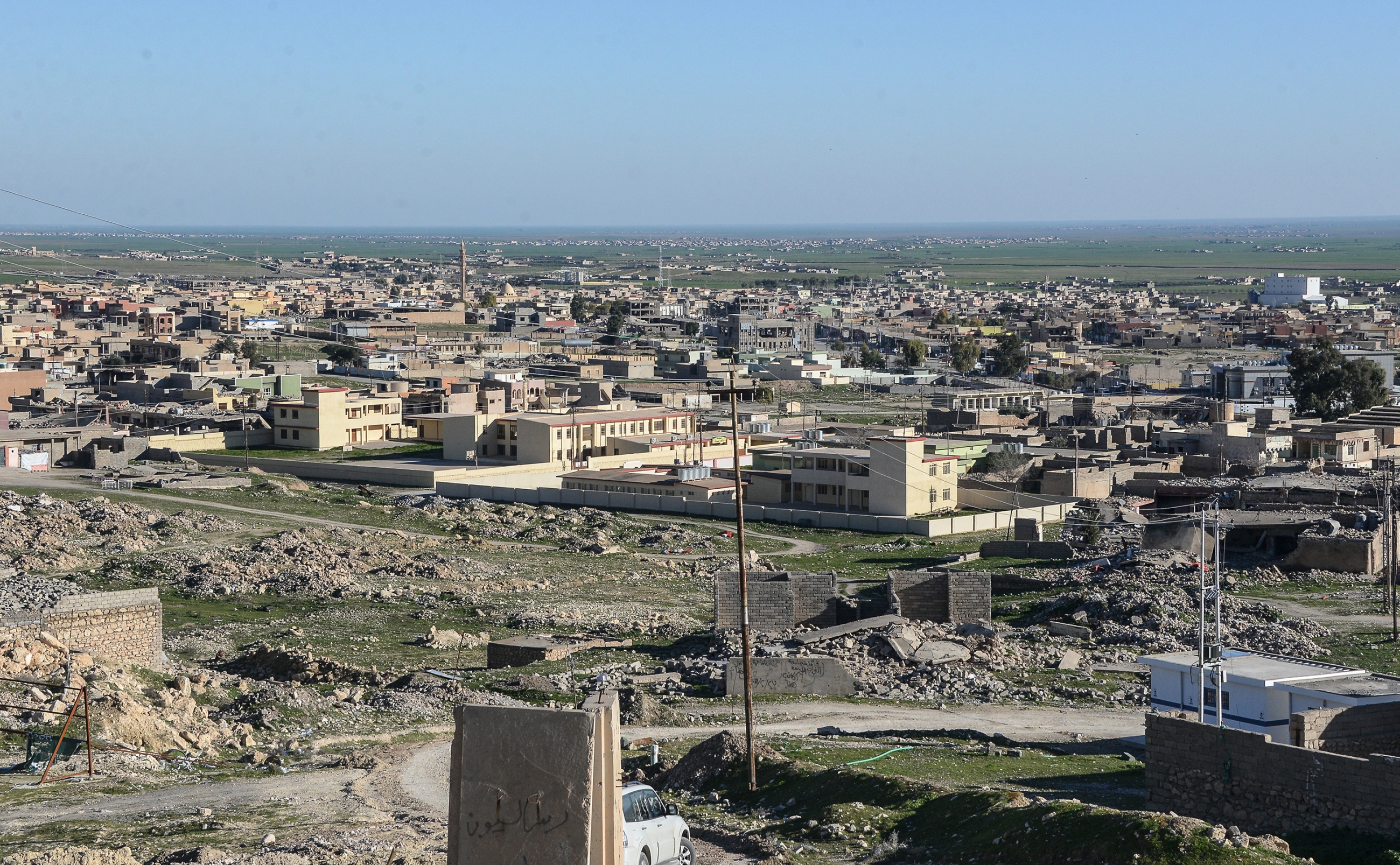
All armed groups will be expelled from the contested Sinjar region of Iraq following a "historic deal" between Baghdad and the Kurdistan Regional Government (KRG).
The agreement, which was signed on 9 October, is set to normalise security and governance in Sinjar and establish a new force to police the northwestern region, which is still recovering from the 2014 onslaught by the Islamic State group.
The primary aim is to end the presence of the Kurdistan Workers’ Party (PKK) and its affiliated armed groups in Sinjar.
The PKK, along with its Yazidi affiliate the Shingal Resistance Unit (YBS), were instrumental in driving out IS in 2014, but have remained in control of much of the region since.
Mustafa Kadhimi, Iraq’s prime minister, “sponsored a historic agreement which will bolster the federal authority in Sinjar as per the constitution in terms of governance and security,” tweeted Ahmed Mullah Talal, the Iraqi PM’s spokesperson.
New MEE newsletter: Jerusalem Dispatch
Sign up to get the latest insights and analysis on Israel-Palestine, alongside Turkey Unpacked and other MEE newsletters
The deal “ends the authority of intruding groups and paves the way for the reconstruction of the city and the full return of its people in coordination with the Kurdistan Regional Government,” he added.
The deal sparked different reactions: the US, UN, and France welcomed it while others, specifically members of the Yazidi religious minority who make up much of Sinjar, denounced it altogether saying they had been excluded from the deal.
In a statement, the PKK-aligned Sinjar Autonomous Administration said excluding residents of Sinjar (which locals refer to as Shingal) and disregarding the city’s will was “unacceptable” and that they rejected any decision without their involvement.
“This deal is not in the interest of Shingal. All ethnic groups in the city reject it and it should be rectified. The US and other countries should not interfere and impose such things on Shingal’s people,” Hussein Haji, co-chair of Sinjar Autonomous Administration, told MEE.
He said that it was a “political deal” rather than a “humanitarian one”, largely aimed at helping the Kurdistan Democratic Party (KDP) - the ruling party in the KRG - curry favour with Baghdad.
Details of the deal
According to Farhad Alaaldin, chairman of the Iraqi Advisory Council, under the deal all armed forces which control the district will be expelled and a new force will be established to secure the area.
Some 2,500 people will be employed, including “1,500 Yazidi youth from the camps and 1,000 young men from Shingal as part of the security forces in the district," he said.
The YBS is one of the five armed groups currently active in the district along with the Iraqi army, Iraqi police, Popular Mobilisation Forces, and the Ezidkhan Protection Forces, a group founded by a local Yazidi leader.
“The importance of the deal for the people of Sinjar is that we protect the area against any threat they face and we secure Sinjar while returning law and order,” Tahsin al-Khafaji, spokesperson for Iraq’s Joint Operation Command told MEE.
MEE contacted the KRG’s spokesperson, Jutyar Adil, but he was not available for comment.
Other details of the agreement include the return of displaced people, electing a new mayor – along with jointly governing other administrative posts - and reconstructing the district after the 2014 IS rampage.
'We are connected to Baghdad and it is we that should reach such a deal with the government, not some other party instead of us'
- Haval Khabat, PKK
IS stormed Sinjar and brutally attacked the Yazidi population in 2014, killing over 5,000 people in what the UN has branded a genocide.
Roughly 360,000 people were displaced from their homeland in the wake of IS. One third of the Yazidi population still lives in camps in northern Iraq as internally displaced persons (IDPs).
“The agreement aims to facilitate the return of over 200,000 IDPs still in camps and unify the administration to enable reconstruction,” Lahib Higel, senior Iraq analyst at the International Crisis Group (ICG) told MEE.
However, she argued, many sides were disregarded in the talks, “including various Yazidi groups and armed factions such as the YBS” because it was a deal between “the government [of Iraq] and the KDP.”
The YBS, backed by the PKK, rejected the deal altogether as they say it was not the sole concern of the KDP to reach a deal like this.
“We are connected to Baghdad and it is we that should reach such a deal with the government, not some other party instead of us,” said Haval Khabat, PKK representative in the Sinjar Autonomous Administration.
Political gain
The deal is a “secret” one which has political benefits for both Baghdad and the KDP, reported local opposition news channel NRT.
According to NRT, the deal is a “preparation for 2021’s parliamentary elections in Iraq” to allow the KDP to return to Sinjar and participate in the elections in the district in order to increase its total votes while in return the KDP will vote for Mustafa Kadhimi to be re-elected as PM.
'We don’t accept the KDP’s return to Sinjar. IS committed genocide against us because of the KDP and we do not want anymore genocide to happen'
- Sinjar Autonomous Administration
The KDP controlled Sinjar before IS took over the city. Hours before the IS assault on Sinjar, the KDP withdrew its forces, leaving the population at the militants' mercy - an act that residents have not forgotten.
“The KDP acted alone and disregarded other parties in the KRG to sign the deal in the name of the Kurdish government," Ibrahim Abbas, a journalist and political analyst based in Erbil, told MEE.
"Therefore, it’s highly likely the KDP got assurance from the Iraqi government to easily add its seats with the votes in Sinjar which can be attained due to the possibility of fraud."
Higel agreed that deal was primarily about “electoral gain” as well as security and administration.
“There is mutual benefit both for the federal government and for the KRG, and KDP more specifically in sorting out this type of arrangement…whether there will be electoral benefits to this later on… you have to view it as a win-win situation.”
After the announcement of the agreement, senior KDP officials hailed it as a “positive step into the right direction”.
International play
Turkey, which has for years been launching air strikes in Sinjar against its arch-foes the PKK, welcomed the deal.
Ankara's Ministry of Foreign Affairs said it hoped it “would enable the reinstating of the control of the Iraqi authorities in Sinjar, the eradication of Daesh [IS] and PKK terrorist organisations and their extensions in the region" and the return of Yezidi refugees "who have been subject to grave oppression and persecution of first Daesh and then of PKK."
The ministry reiterated its readiness to cooperate with the Iraqi authorities in "ensuring stability and countering terrorism in Sinjar as well as in other regions of Iraq where the terrorist organisation exists".
Turkey has carried out military campaigns against the PKK in Turkey and Iraq, with strikes against the group in Iraq stepped up over the last year.
The PKK has differences with the KDP and they are arch-rivals. The KDP enjoys good diplomatic and economic relations with Turkey.
“The strongest possibility is that Turkey is behind the agreement because the PKK has consolidated its stronghold in the area. The KDP, on the other hand, sees the PKK as the only obstacle to its agenda, so both Turkey and KDP see the PKK as a real threat. This is where Ankara and Erbil’s interest cross,” Abbas said.
He also added that the deal is a “trilateral one” as “the Iraqi government wants the KDP presence in Sinjar rather than the PKK.
“The presence of Turkey and the statement of congratulations by the US, UN and France led us to the conclusion that they are behind the deal, specifically Turkey, as it wants instability to reoccur in the region,” said Haji.
Compliance by all forces
It is highly unlikely that all forces present in Sinjar will comply with the agreement, Higel warned.
“Under its current form, it is unlikely that all armed forces that were excluded from the agreement will comply unless there is negotiation over the implementation process,” said Higel.
"This mainly pertains to the PKK and its affiliated groups which claim they have a right to partake in the new institutional framework."
There are, however, other Yazidi groups that welcomed the deal.
“We support the agreement and 70 percent of it is in the interest of Shingal people. It will resolve the issues between Turkey and Iraq,” Haidar Shasho, leader of the Ezidkhan Protection Forces told MEE.
The Ezidkhan Protection Forces has 7,000-8,000 fighters and was founded in the summer of 2014 in the response to the IS slaughter.
Shasho added that the deal does not give Turkey “anymore justification to bomb our areas” because “those who are not indigenous people of Shingal will be expelled and by that, I mean PKK.”
The Sinjar Autonomous Administration warned that they would not sit idly and let the KDP return to the city.
“We don’t accept the KDP’s return to Sinjar. IS committed genocide against us because of the KDP and we do not want anymore genocide to happen,” said Khabat.
Higel argued that in order to satisfy all parties involved “there must be simultaneous bottom-up deliberation processes with all local groups in order to ensure that their voices are heard as new directions are implemented from the top.”
Middle East Eye delivers independent and unrivalled coverage and analysis of the Middle East, North Africa and beyond. To learn more about republishing this content and the associated fees, please fill out this form. More about MEE can be found here.


